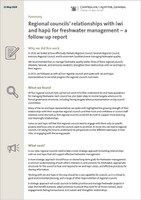Summary of our report
 Why we did this follow-up work
Why we did this follow-up work
In 2019, we looked at how effectively Waikato Regional Council, Taranaki Regional Council, Horizons Regional Council, and Environment Southland were managing freshwater quality.
We recommended that, to manage freshwater quality better, three of these regional councils (Waikato, Taranaki, and Horizons) needed to strengthen their relationships with iwi and hapū in their regions.
In 2023, we followed up with all four regional councils and spoke with iwi and hapū representatives to see what progress the regional councils had made.
What we found
All four regional councils have carried out work to further understand iwi and hapū aspirations for managing freshwater. Each council has also taken steps to involve tangata whenua in its formal governance structures, including having tangata whenua representation on key council committees.
Many of the iwi and hapū representatives we spoke with highlighted the growing strength of their relationships with their respective regional councils and their trust and confidence in council staff. However, some also told us that regional councils could still do more to support more enduring and meaningful relationships.
Some iwi and hapū still feel that regional councils tend to engage with them only on specific projects and focus only on what the councils want to prioritise. At times this can lead to regional councils not taking the time to understand iwi perspectives on the different waterways in their rohe, or engaging with the wrong people.
What next?
In our view, regional councils need to take a more strategic approach to building relationships with iwi and hapū that will support effective freshwater management.
A more strategic approach should focus on shared long-term goals for freshwater management; a common understanding of each other’s interests in, and concerns for, freshwater; appropriate structures for the council to hear and respond to iwi and hapū voices; and effective processes for sharing information.
Working with iwi and hapū in this way should be a core capability for councils, as it is critical to good environmental planning, and a range of other responsibilities of regional councils.
A strategic approach will assist councils to better prioritise and manage freshwater projects in ways that benefit everyone, adapt processes to ensure they work for all those involved, avoid engagements feeling transactional, and sustain and strengthen relationships.

